 Hyundai Sonata: Rear seat
Hyundai Sonata: Rear seat
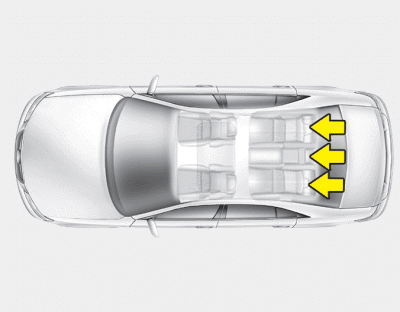
Headrest
The rear seat(s) is equipped with headrests in all the seating positions for the occupant's safety and comfort. The headrest not only provides comfort for passengers, but also helps to protect the head and neck in the event of a collision.
WARNING
- For maximum effectiveness in case of an accident, the headrest should be adjusted so the middle of the headrest is at the same height of the center of gravity of an occupant's head. Generally, the center of gravity of most people's head is similar with the height of the top of their eyes. Also adjust the headrest as close to your head as possible. For this reason, the use of a cushion that holds the body away from the seatback is not recommended.
- Do not operate the vehicle with the headrests removed as severe injury to an occupant may occur in the event of an accident. Headrests may provide protection against severe neck injuries when properly adjusted.
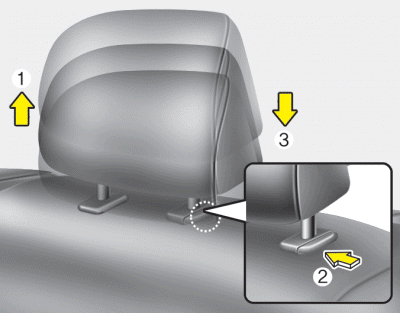
Adjusting the height up and down
To raise the headrest, pull it up (1). To lower the headrest, push and hold the release button (2) on the headrest support and lower the headrest (3).
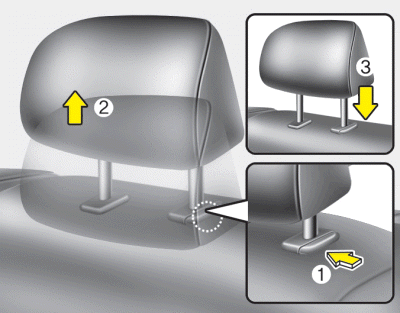
Removal
To remove the headrest, raise it as far as it can go then press the release button (1) while pulling upward (2).
To reinstall the headrest, put the headrest poles (3) into the holes while pressing the release button (1). Then adjust it to the appropriate height.
WARNING
Make sure the headrest locks in position after adjusting it to properly protect the occupants.
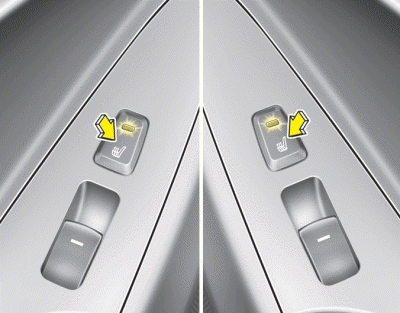
Seat warmer (if equipped)
The seat warmer is provided to warm the rear seats during cold weather. With the ignition switch in the ON position, push either switch to warm the seat.
During mild weather or under conditions where the operation of the seat warmer is not needed, keep the switches in the "OFF" position.
✽ NOTICE
With the seat warmer switch in ON position, the heating system in the seat turns on or off automatically depending on the seat temperature.
CAUTION
- When cleaning the seats, do not use an organic solvent such as thinner, benzene, alcohol or gasoline. Doing so may damage the surface of the heater or seats.
- To prevent overheating the seat warmer, do not place anything on the seats that insulates against heat, such as blankets, cushions or seat covers on the seats while the seat warmer is in operation.
- Do not place heavy or sharp objects on seats equipped with seat warmers. Damage to the seat warming components could occur.
WARNING - Seat warmer burns
Passengers should use extreme caution when using seat warmers due to the possibility of excess heating or burns. The seat warmer may cause burns even at low temperatures, especially if used for long periods of time. In particular, the driver must exercise extreme care for the following types of passengers:
1. Infants, children, elderly or handicapped persons, or hospital outpatients
2. Persons with sensitive skin or those that burn easily
3. Fatigued individuals
4. Intoxicated individuals
5. Individuals taking medication that can cause drowsiness or sleepiness (sleeping
pills, cold tablets, etc.)
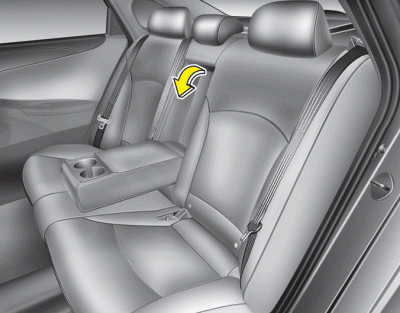
Armrest
The armrest is located in the center of the rear seat. Pull the armrest down and you will find the cup holders.
Folding the rear seat
The rear seatbacks can be folded to facilitate carrying long items or to increase the luggage capacity of the vehicle.
WARNING
The purpose of the fold-down rear seatbacks is to allow you to carry longer objects that could not be accommodated in the cargo area. Never allow passengers sit on top of the folded down seatback while the vehicle is moving. This is not a proper seating position and no seat belts are available for use.
This could result in serious injury or death in case of an accident or sudden stop. Objects carried on the folded down seatback should not extend higher than the top of the front seatbacks. Doing this could allow cargo to slide forward and cause injury or damage during sudden stops.
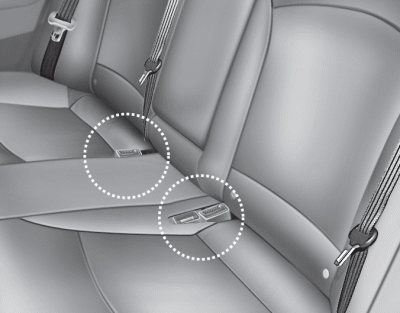
To fold down the rear seatback:
1. Insert the rear seat belt buckle in the pocket (if equipped) between the rear seatback and cushion.
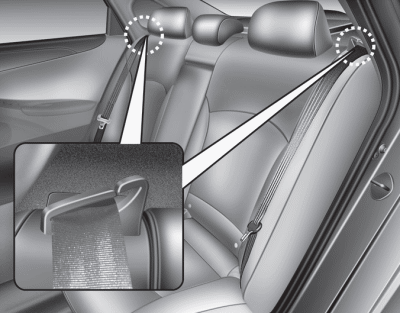
2. Make sure the rear seat belt webbing is in the guide to prevent the seat belt
from being damaged.
3. Set the front seatback to the upright position and if necessary, slide the front
seat forward.
4.Lower the rear headrests to the lowest position.
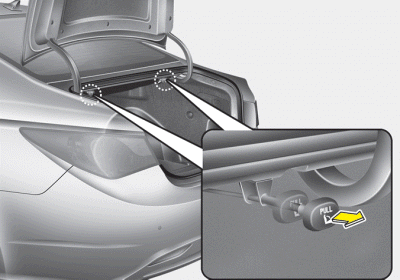
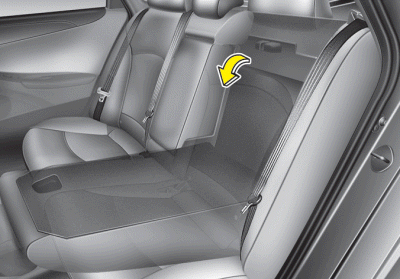
5. Pull on the seatback folding lever located in the trunk, then fold the seat
toward the front of the vehicle.
6. To use the rear seat, lift and pull the seatback rearward. Push the seatback
firmly until it clicks into place. Make sure the seatback is locked in place. When
you return the seatback to its upright position, always be sure it has locked into
position by pushing on the top of the seatback.
7. Return the rear seat belt to the proper position.
WARNING
When you return the rear seatback to its upright position after being folded
down:
Be careful not to damage the seat belt webbing or buckle. Do not allow the seat
belt webbing or buckle to get caught or pinched in the rear seat. Ensure that the
seatback is completely locked into its upright position by pushing on the top of
the seatback. Otherwise, in an accident or sudden stop, the seat could fold down
and allow cargo to enter the passenger compartment, which could result in serious
injury or death.
CAUTION - Damaging rear seat belt buckles
When you fold the rear seatback, insert the buckle in the pocket between the rear seatback and cushion. Doing so can prevent the buckle from being damaged by the rear seatback.
CAUTION - Rear seat belts
When returning the rear seatbacks to the upright position, remember to return the rear shoulder belts to their proper position. Routing the seat belt webbing through the rear seat belt guides will help keep the belts from being trapped behind or under the seats.
WARNING - Cargo
Cargo should always be secured to prevent it from being thrown about the vehicle in a collision and causing injury to the vehicle occupants. Do not place objects in the rear seats, since they cannot be properly secured and may hit the front seat occupants in a collision.
WARNING - Cargo loading
Make sure the engine is off, the automatic transaxle is in P (Park) or the manual transaxle is in R (Reverse) or 1st, and the parking brake is securely applied whenever loading or unloading cargo. Failure to take these steps may allow the vehicle to move if the shift lever is inadvertently moved to another position.
 Front seat
Front seat
Manual adjustment
Forward and rearward
To move the seat forward or rearward:
1. Pull the seat slide adjustment lever up and hold it.
2. Slide the seat to the position you desire.
3. Release t ...
 Seat belts
Seat belts
...
See also:
Troubleshooting
Basic Troubleshooting
Basic Troubleshooting Guide
Customer Problem Analysis Sheet
Basic Inspection Procedure
Measuring Condition of Electronic Parts' Resistance
The mea ...
Variable Intake Solenoid (VIS) Valve. Description and Operation
Description
Variable Intake manifold Solenoid (VIS) valve is installed on the intake
manifold. The VIS valve controls the vacuum modulator which activates a valve
in the intake manifold. The ...
Specifications
Specifications
Hood
Type
Rear hinged, gas lifter type
Front Door
Construction
Front hinged, frame door construction
...
